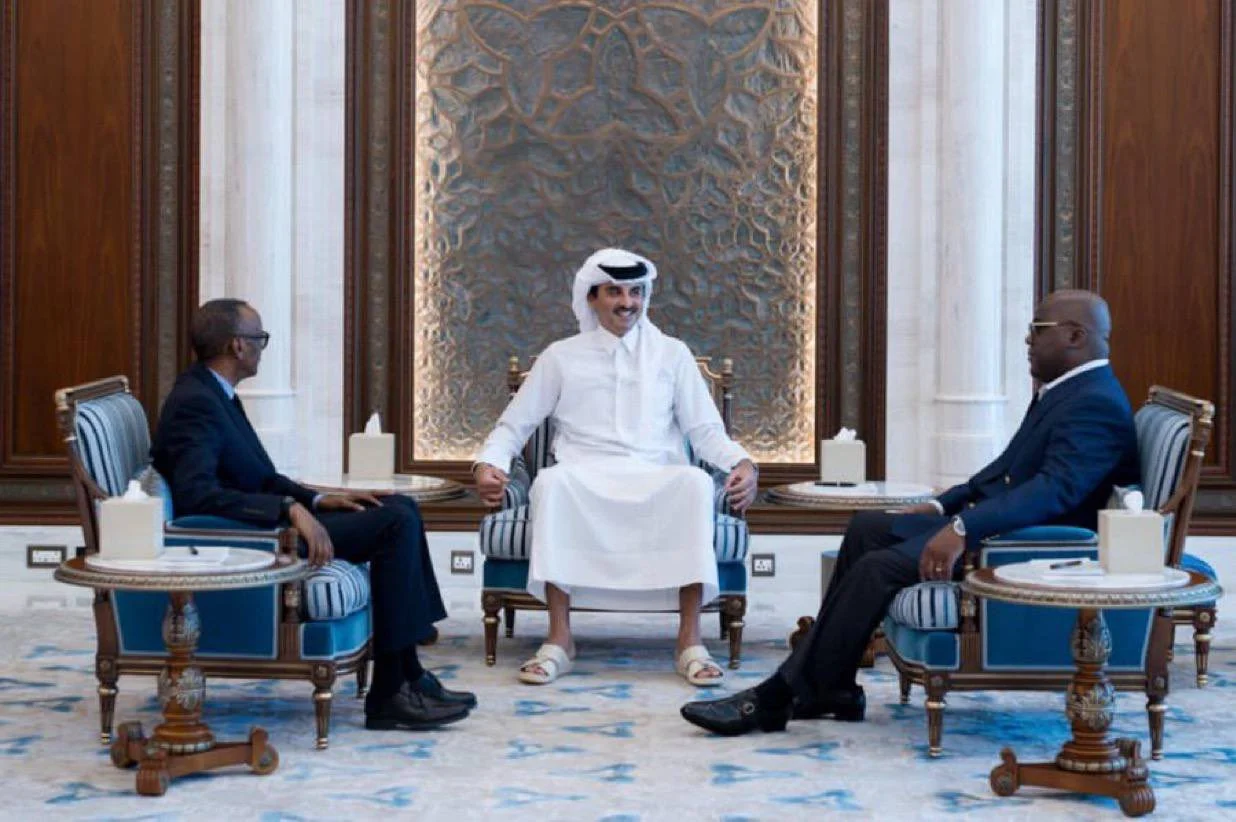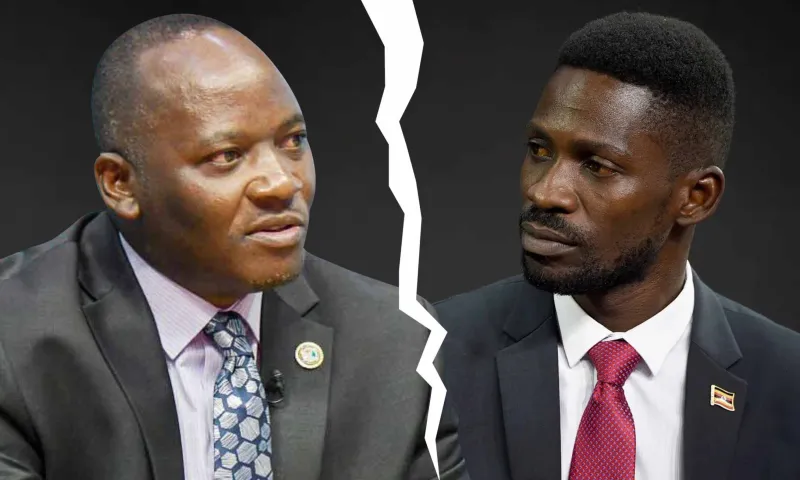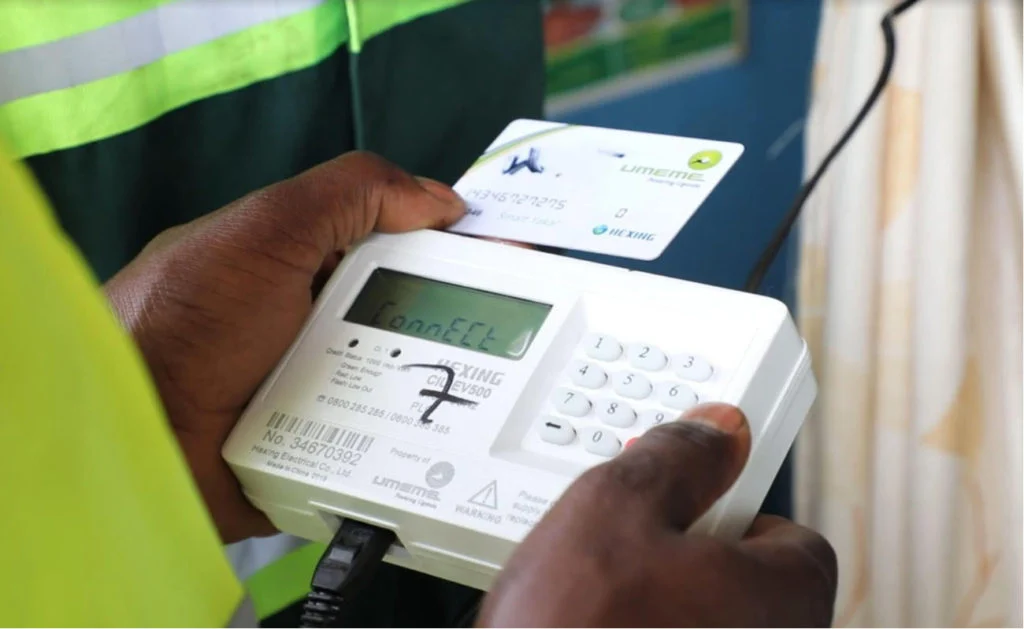News
The High Stakes Behind Kagame and Tshisekedi’s Talks in Doha

Rwandan President Paul Kagame and his Congolese counterpart Félix Tshisekedi met in Doha on Tuesday in a significant diplomatic breakthrough mediated by Qatar’s Emir Sheikh Tamim bin Hamad Al Thani.
The meeting, held at Lusail Palace, marked the first time in months that the two leaders sat across from each other, despite the worsening conflict in eastern DR Congo and growing international pressure.
For over two years, relations between Kigali and Kinshasa have been marked by open hostility, with Tshisekedi accusing Rwanda of backing the M23 rebel group, which has seized strategic towns in North Kivu province.
Kagame has denied the allegations and, in turn, pointed to the presence of the Democratic Forces for the Liberation of Rwanda (FDLR), a militia with links to the perpetrators of the 1994 Rwandan genocide, as a persistent security threat to Rwanda.
Attempts by other African leaders, including Angola’s President João Lourenço, had failed to bring the two to direct negotiations.
But Qatar succeeded where others could not, raising questions about what changed.
Kagame’s office framed the Doha meeting as a reaffirmation of support for the joint East African Community-SADC (EAC-SADC) peace process.
Rwanda also emphasized the need to address the FDLR’s presence in eastern DR Congo and ensure regional security.
Meanwhile, Qatar’s Foreign Ministry hailed the discussions as an important step toward stability in the Great Lakes region. Although no immediate resolutions were announced, the meeting reflected shifting political calculations on both sides.
The fact that Tshisekedi, who had previously likened Kagame to Adolf Hitler, agreed to the talks suggests that Kinshasa’s diplomatic posture may be evolving.
His government had largely dismissed earlier mediation efforts, opting instead for military and diplomatic isolation of Rwanda, including pushing for sanctions.
But with the situation on the ground deteriorating and M23 fighters continuing to gain territory, the Congolese leader may have found it necessary to explore other diplomatic avenues.
Rwanda, on the other hand, has faced increasing international sanctions over its alleged support for M23.
The United States, the European Union, and other Western countries have imposed restrictions on Rwandan officials, suspended military aid, and pressured Kigali to disengage from eastern DR Congo. However, these punitive measures have not altered Rwanda’s position, and M23 remains a dominant force in the conflict.
This is where Qatar’s intervention takes on added significance. Unlike Western nations, which have approached the conflict largely through the lens of punitive measures, Qatar has opted for engagement.
Its interest in mediating the crisis is not purely altruistic—it is also tied to economic stakes in both Rwanda and DR Congo.
Qatar has made substantial investments in Rwanda, including a 49% stake in RwandAir and a controlling 60% share in Bugesera Airport, which is under construction south of Kigali at a cost of at least $2 billion.
These investments make Rwanda one of Qatar’s most significant economic partners in Africa. Meanwhile, Qatar has also signaled its intent to expand its footprint in DR Congo.
After Kinshasa established an embassy in Doha, Qatar pledged to support infrastructure projects, including the renovation of N’djili and N’Dolo airports in Kinshasa and Luano Airport in Lubumbashi.
The Gulf state has also expressed interest in the construction of a deep-sea port at Banana, a venture currently led by UAE-based DP World.
With these economic interests in mind, Qatar’s diplomatic maneuvering appears to be aimed at preserving stability in a region where it is increasingly invested.
By securing a face-to-face meeting between Kagame and Tshisekedi, Qatar has positioned itself as a key broker in a crisis that has defied multiple regional and international mediation attempts.
Whether this latest diplomatic push will yield tangible progress remains to be seen. Despite the meeting in Doha, fighting in eastern DR Congo continues, and M23 has yet to commit to any major concessions.
The Congolese government still demands that Rwanda withdraw its alleged support for the rebels, while Kigali insists that the underlying causes of the conflict—including the FDLR’s presence—must be addressed.
Nonetheless, the fact that Kagame and Tshisekedi were willing to engage in dialogue after months of heightened tensions suggests that the geopolitical landscape is shifting. The failure of previous mediation efforts, the military deadlock, and the economic interests at play may have contributed to bringing the two leaders to the table.
For now, Qatar has succeeded in achieving what others could not: breaking the ice. What comes next will depend on whether the momentum from Doha can translate into lasting diplomatic engagement.

News
Bobi Mobilised People to Speak ill About me in my Constituency – Mpuuga

The national coordinator of the Democratic Alliance (DA), Mathias Mpuuga has accused Robert Kyagulanyi, also known as Bobi Wine, the president of the National Unity Platform (NUP), of rallying individuals to speak poorly of him.
Mpuuga, a former Leader of the Opposition (LoP), alleges that Kyagulanyi organized people for a month to disparage him in his constituency of Nyendo-Mukungwe municipality.
He made the remarks while speaking to NBS Television on Wednesday.
“The Hon. Bobi Wine all due respect to him, mobilised people for a month to go to my constituency to speak ill about me.” Mpuuga said.
He questioned why Kyagulanyi did not use the same effort to hold a rally against the Electoral Commission.
Mpuuga, who claims to have restrained himself from discussing certain matters and individuals, further accused his former party, NUP, of individually contacting MPs to portray him as a bad person.
“I have constrained myself a lot. If I spoke about certain things and individuals, you would be shocked. You would not know for example, how NUP would call MPs, one by one to educate them on how Mpuuga is a bad man.” Mpuuga said.
Mpuuga’s relationship with NUP soured last year after the party accused him of corruption for receiving a controversial Shs500 million as a “service award.”
This issue stemmed from a meeting held by the Parliamentary Commission on May 6, 2022, where Mpuuga and three other parliamentary commissioners reportedly divided a total of Shs1.7 billion among themselves as a service award, despite having served for less than a year.
Mpuuga allegedly received Shs500 million, while the other three commissioners each received Shs400 million.
This service award, which dominated headlines for months, led NUP leader Kyagulanyi to demand that Mpuuga apologize and resign from his position as Leader of the Opposition.
Since then, Mpuuga and Kyagulanyi have been at odds, with Mpuuga establishing his own civic organization, the DA, which many believe is aimed at countering NUP
News
Shocker As Students Attack Police Station Over Teacher’s Detention

A group of about 80 students from Nebbi Town Secondary School attacked Nebbi Police Station on Tuesday in an attempt to rescue their games teacher, who had been detained for preventive arrest.
According to Nebbi Central Police Station, the incident occurred at around 11:45am when students, armed with stones, bricks, and sticks, stormed the station entrance.
Officers attempted to calm the situation, but the students forcibly freed their teacher, prompting police to fire warning shots into the air to disperse the crowd.
Emmanuel Okello, the games teacher at Nebbi Town Secondary School, was arrested following allegations that he attempted to incite students to disrupt the finals of a football tournament.
On March 17, Nebbi Town SS played against Comboni SS and lost, sparking anger among students and their games teacher, who accused officials of poor officiating.
A meeting was held later that night at the district boardroom to resolve the matter, during which the District Inspector of Schools ordered Okello’s detention to prevent potential violence.
Following the attack on the station, police managed to re-arrest Okello and took three students into custody.
The school administration condemned the students’ actions, apologized, and pleaded for the release of both the teacher and students, promising to address the issue internally.
The District Police Commander agreed, on the condition that such incidents would not happen again.
After the situation was brought under control, the tournament finals proceeded, with Mamba SS emerging as the champions after defeating Comboni SS.
Collins Asea, the regional police spokesperson for the West Nile sub-region, confirmed the incident and condemned the students’ actions, stating that attacking a police facility is a serious offense.
He urged school authorities to strengthen discipline and conflict resolution mechanisms to prevent such incidents.
Additionally, he advised students to use peaceful and lawful channels to address grievances rather than resorting to violence, warning that, in the future, such acts could lead to more severe legal consequences.
News
Govt Ready to Take Over Umeme Concession – Nankabirwa

The government has reaffirmed its preparedness to take over Uganda’s electricity distribution network from Umeme Limited, with the transition set to be managed by the Uganda Electricity Distribution Company Limited (UEDCL) starting April 1, 2025.
Energy minister Ruth Nankabirwa said the government is fully ready to assume control of the concession and is committed to ensuring improved service quality, a seamless transition, and addressing power reliability challenges.
“The government is fully prepared to take over the Umeme concession through UEDCL by April 1, 2025. We are committed to improving service quality, ensuring a smooth transition, and addressing power reliability challenges,” Nankabirwa said.
However, the takeover comes amid concerns raised by the Auditor General’s office over the Shs692.688 billion ($190 million) loan that the government seeks to secure from Stanbic Bank Uganda for Umeme’s buyout.
The Auditor General has called for a delay in Parliament’s approval of the loan until a thorough audit of the figures submitted by Umeme is completed.
Joseph Hirya, director of Audit in the Office of the Auditor General, said that discrepancies in Umeme’s submitted figures required further scrutiny before final figures could be presented.
“We request a few more days, not beyond March 28, 2025, so that we can provide the actual figures,” Hirya told Parliament’s Committee on National Economy. “It is better to pay interest on the loan knowing that it is based on accurate figures.”
Hirya also clarified that the reports submitted to Parliament were not final and would undergo further quality checks before being signed off. He stressed that the delay was necessary to ensure the integrity of the financial figures guiding the buyout decision.
The Ministry of Finance, Planning, and Economic Development is finalising arrangements to secure $50 million (Shs185 billion) through internal borrowing to support UEDCL’s capital investments.
These funds, expected to be available by the end of next week, are meant to ensure UEDCL is financially equipped to sustain and enhance electricity distribution services.
Despite this, concerns have been raised about UEDCL’s readiness to assume control of the distribution network. Engineer Ziria Tibalwa, chief executive of the Electricity Regulatory Authority (ERA), told Parliament on Tuesday that the transition remains a challenge due to financial constraints and inadequate investment in preparation for the takeover.
“We aren’t even ready with the $50 million for UEDCL to start, yet the concession agreement wouldn’t allow UEDCL to step in,” Tibalwa said.
She suggested that early investments in collaboration with Umeme would have made for a smoother transition.
Power outages across the country have further exposed the difficulties surrounding the shift, with Tibalwa attributing them to clauses in Umeme’s concession that prevent government intervention until the contract officially ends.
Addressing staffing concerns, the Ministry of Energy emphasised that UEDCL’s restructuring process is designed to enhance efficiency, eliminate role duplication, and ensure cost-effectiveness in electricity distribution.
The recruitment process, the ministry noted, has been conducted transparently and on a merit basis to ensure that the most qualified personnel are retained.
Nankabirwa, however, remains focused on securing Parliament’s approval of the loan and finalising the buyout process before the March 31 deadline.
She urged lawmakers to expedite the matter, warning that any delays could lead to costly interest penalties.
“The government must move quickly to ensure a seamless transition,” she said, adding that any discrepancies between figures provided by the regulator, the Auditor General’s office, and an external consultant would be addressed promptly.
-

 Fashion8 years ago
Fashion8 years agoThese ’90s fashion trends are making a comeback in 2017
-

 Entertainment8 years ago
Entertainment8 years agoThe final 6 ‘Game of Thrones’ episodes might feel like a full season
-

 Fashion8 years ago
Fashion8 years agoAccording to Dior Couture, this taboo fashion accessory is back
-

 Entertainment8 years ago
Entertainment8 years agoThe old and New Edition cast comes together to perform
-

 Business8 years ago
Business8 years agoUber and Lyft are finally available in all of New York State
-

 Sports8 years ago
Sports8 years agoPhillies’ Aaron Altherr makes mind-boggling barehanded play
-

 Entertainment8 years ago
Entertainment8 years agoDisney’s live-action Aladdin finally finds its stars
-

 Sports8 years ago
Sports8 years agoSteph Curry finally got the contract he deserves from the Warriors
